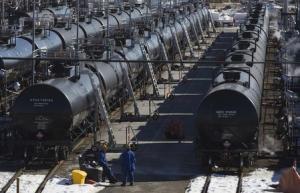NATURAL GAS: Enormous Northwest refineries would feed China exclusively
SEATTLE -- China is seeking to tap the flood of cheap natural gas coming from the interior of North America by converting it to methanol at three huge refineries in Washington and Oregon.
The processing plants, collectively called Northwest Innovation Works, have received little attention despite their head-snapping impact:
- The refineries could increase demand for natural gas in the Pacific Northwest by 40 percent.
- They would more than triple the size of the fast-growing U.S. methanol industry.
- With an estimated $7 billion price tag, the refineries would be one of the largest investments ever by China in new U.S. manufacturing.
- The largest plant, planned for Tacoma, could use more water than all the residential customers of the city's public utility district combined.
However, the plan is being viewed warily by Pacific Northwest environmental groups, which have proved effective at slowing a long list of proposals to deliver coal, oil and natural gas from the continent's midsection to hungry markets in Asia.
"They fit into the pattern of more fossil-fuel infrastructure built on the Columbia that we have concerns about," said Brett VandenHeuvel, the executive director of Columbia Riverkeeper. Two of the three refineries would sit on the banks of the Columbia River.
The Chinese proposal, first made public last year, is different from other projects that would export raw fossil fuels. First, the end goal is methanol, a crucial building block of plastic and many other materials of modern life. Second, China would be the sole recipient.
Third is that it aims to lower greenhouse gas emissions in China, while raising them to a lesser degree on American shores. China is the world's largest producer and consumer of methanol, and it manufactures almost all of it from coal, which creates a great deal of carbon emissions.
Reducing carbon emissions across industries is an increasingly urgent goal for China, which will be a key player at the Paris climate talks at the end of this month. In September, China announced it would establish a carbon-trading market by 2017.
The Pacific Northwest venture claims that using natural gas instead would reduce emissions by 70 percent, and that it will employ a new technique that reduces the carbon footprint even further.
Northwest Innovation Works says the three refineries would create 3,000 construction jobs and 460 permanent jobs. It could spawn new customers for natural gas in the Pacific Northwest, where industrial jobs have been on the wane. The proposal has received an enthusiastic endorsement from Washington Gov. Jay Inslee (D).
The factories would also use enormous quantities of water, an obvious selling point for China and a potential flashpoint in the Pacific Northwest. China has chronic water shortages, while Washington and Oregon have lots of it -- though that supply is in question as climate change reduces the region's snowpack.
Two of the refineries would sit on opposite banks of the Columbia River, one in Clatskanie, Ore., about an hour's drive northwest of Portland, and the other at the Port of Kalama in Washington state. Both would produce about 5,000 metric tons of methanol a day, which would put them on par with the world's largest methanol plants.
But both would be dwarfed by a third proposed refinery at Tacoma, a busy industrial port a half-hour south of Seattle. Double the size of the other two, it would be the largest methanol refinery ever built.
Cheap gas fires up U.S. methanol
The new refineries would bring an even steeper growth curve to an already fast-growing methanol industry in the United States.Methanol, also known as methyl alcohol or wood alcohol, is a precursor to hundreds of products, from plastics to fabrics to paints to windshield wiper fluid. The Washington and Oregon projects, like other plants, would combine natural gas with steam and heat to make a synthesis gas of carbon monoxide, carbon dioxide and hydrogen. That gas is heated and compressed and run over a catalyst to make a crude methanol, and then it is distilled with water.
The resulting methanol -- colorless, flammable, and a liquid at atmospheric temperature -- would be shipped to China, where it would be converted into olefins, such as ethylene and propylene, and used to make a range of products..... read more here






